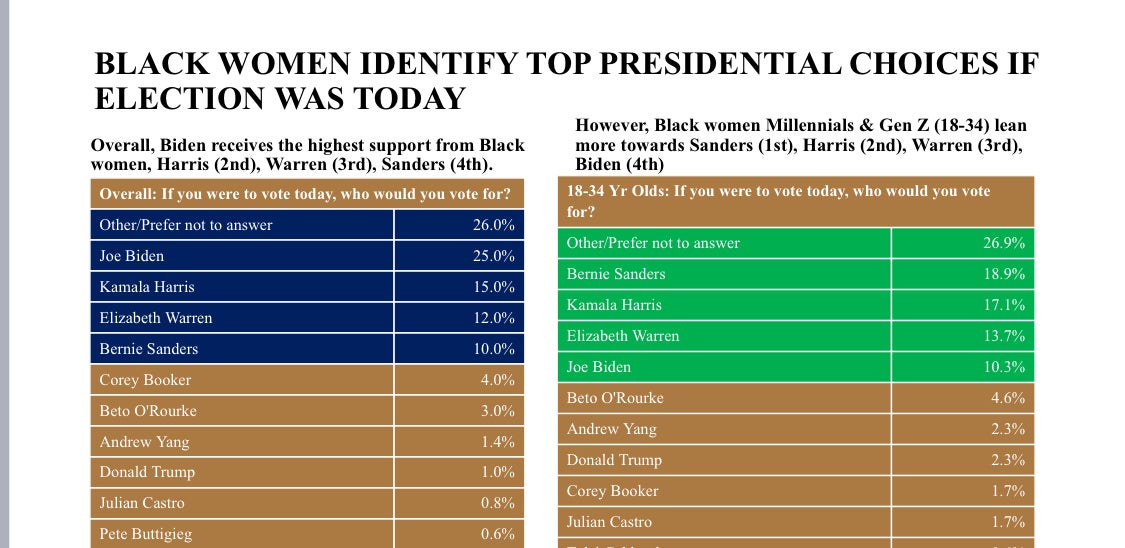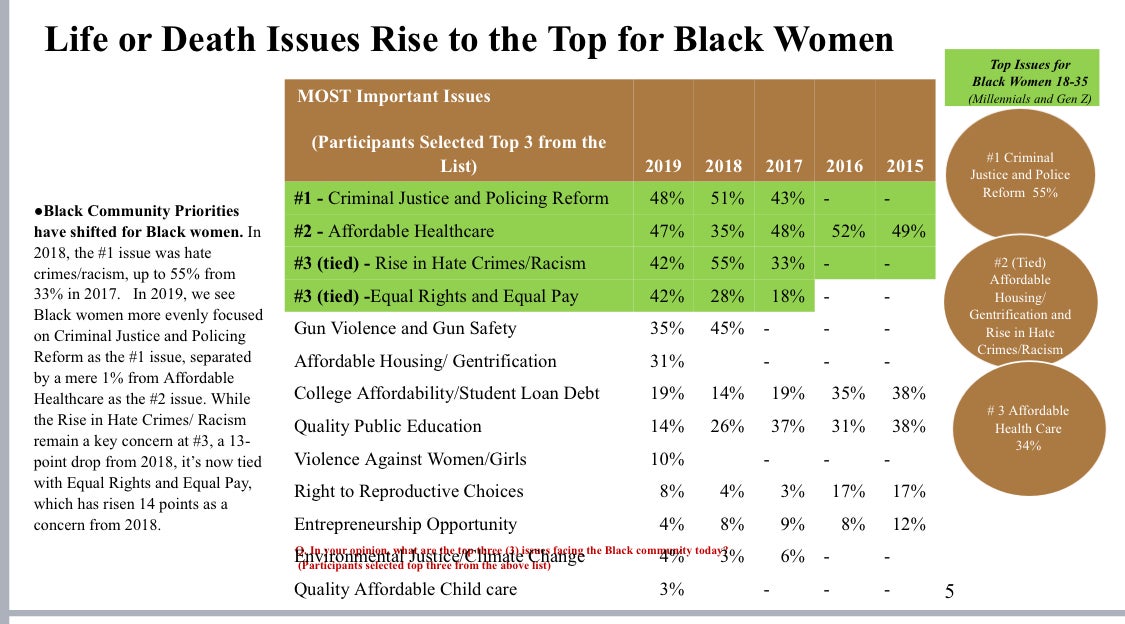Black women continue to shift the political landscape, particularly within the Democratic Party, even though the issues of most concern for Black women have changed, according to the 5th annual ‘Power of the Sister Vote’ survey released by Black Women’s Roundtable, an intergenerational public policy network conceptualized and formed by the National Coalition on Black Civic Participation, in partnership with ESSENCE.
The survey, which polled 1,068 Black women representing a range of ages, as well as diversity in economic and education backgrounds, focused primarily on which candidate would participants vote for if the election were held today, and what most concerns Black women this election cycle, and what those candidates have to do to earn their votes.
Interestingly, the results reveal a chasm between the political leanings of Millennials and Generation Z (18-34), Black women between the ages of 35-50, and older.
While older Black women polled continue to place their hopes in the centrism of former Vice-President Joe Biden (25%), younger Black women (18.9%) polled responded that they would vote for progressive Sen. Bernie Sanders (D-VT) if the 2020 presidential election were held today.
Sen. Kamala Harris (D-CA) comes in second with both groups (15% and 17.1% respectively); Sen. Elizabeth Warren (D-Mass) comes in third (12% and 13.7% respectively). New Jersey Sen. Cory Booker (1.7%) continues struggling to gain traction even as the Democratic field narrows.

The survey finds that President Donald Trump continues to receive an ‘F’ grade for his job performance, with approximately 80% of Black women polled failing him.
What Do Black Women Want?
Black community priorities have shifted for some Black women. In 2019, criminal justice and policing reform are the number one issue, separated by a mere 1% from affordable healthcare as the number two issue. In 2018, the number one issue was hate crimes/racism, up to 55% from 33% in 2017. While hate crimes/racism remains a key concern at number three, with a 13-point drop from 2018, it is now tied with equal rights and equal pay, which has risen 14 points as a concern from 2018.
Financial safety and reduced taxes for lower-income and middle class families ranked as the top issue for older Black women polled, while 51% percent of Millennials and Gen Z respondents rank addressing the catastrophic rates of Black maternal morbidity and infant death as their top priority.
Gun safety, gentrification, college affordability, and quality education also top the list as pressing concerns of the respondents—as well as climate change and environmental injustice.

“Black women participating in the poll are conveying that they are concerned about the rise in white supremacy, police violence against unarmed Black people going unchecked by the justice system; and the increase of mass killings—primarily perpetrated by young white men, who are targeting people of color, Jewish people, and people who are not welcomed by white nationalists,” Melanie Campbell, President and CEO Convener of Black Women’s Roundtable, tells ESSENCE.
The Democratic Party Is Not Regaining Black Women’s Trust
Black women’s confidence in the Democratic Party, which has fallen in recent years, remains stagnant.Overall, 73% of Black women, which was the same as in 2018, identified Democrats as the party that best represents their issues, however 23.6% identified as Independents or non-affiliated and 0.01% as Republican. In contrast, only 45 % of Black women 25-35 agreed that the Democratic Party best represented their interests, with nearly one-third indicating that no party represents them. These data points may reflect the top-bottom flip between Biden and Sanders among Black women 35 and older vs. Black women between the ages of 18-34.
According to the 2018 Power of the Sister Vote survey, the Democratic Party experienced a 12 percent drop in support from Black women from 2017, while the percentage of Black women who said neither Democrats nor the Republican Party represents their best interests increased by one percent—21 percent in 2017 to 22 percent in 2018.
Further, the percentage of Black women who think the Republican Party best represents them has increased by nearly two percent—as noted by the slight increase in Black women who would vote for Trump.
“Black women, especially younger women, believe the Democratic Party must do more to regain their trust and demonstrate that they are the party that best represents their interests,” Dr. Avis Jones-DeWeever, author, researcher, and editor-in-chief for the 2019 BWR Report, tells ESSENCE. “This year’s poll results appears to reflect this sentiment.”
While some of the concerns have shifted—depending on what has been perceived to be more urgent—it remains clear that Black women are engaged in the political process and, per traditional, fully invested in the emotional, physical, and financial health of Black communities, as well as the well-being of the nation as a whole.
Click here to read the full 2019 ‘Power of the Sister Vote’ survey.
